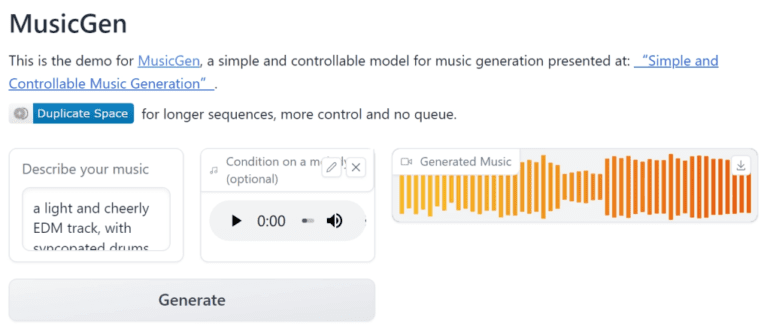TL;DR:
- Generative AI tools have revolutionized text and visual content creation, and now Meta has introduced MusicGen for music generation.
- MusicGen uses text or melody prompts to create original music by leveraging a vast database of song samples and instrument styles.
- It has been trained on 20,000 hours of music, offering musicians and marketers new avenues for creativity.
- Legal challenges may arise due to potential copyright violations, but the effectiveness of regulations remains uncertain.
- AI-generated songs are likely to dominate the music industry in the future, opening up diverse opportunities for music creation.
Main AI News:
The immense potential of generative AI tools in shaping textual and visual content has been widely recognized and harnessed. However, the realm of audio and music creation through AI systems has remained relatively unexplored. Despite resistance from the music industry, recent examples have showcased the power of AI in producing captivating tracks, such as the viral sensation featuring Drake and The Weeknd, entirely generated by AI without any artist involvement. This raises intriguing possibilities for the future of the music industry and its potential disruption.
Recognizing the uncharted territory awaiting exploration, Meta has unveiled its latest generative AI marvel, aptly named ‘MusicGen.’ Designed with the sole purpose of facilitating novel music creation, MusicGen leverages text or melody prompts to generate captivating musical pieces. By incorporating a rich database of song samples and instrument styles within its generative elements, MusicGen can breathe life into your creative vision.
Using MusicGen is remarkably straightforward. You can either specify the desired genre or even hum a tune, and the AI model will produce a range of audio outputs, each a unique variation of your input. This breakthrough tool draws upon an extensive training dataset of 20,000 hours of music, comprising complete tracks and individual instrument samples. Although not yet widely accessible, a mesmerizing demonstration is available for you to explore, hinting at the transformative potential of MusicGen for musicians, marketers, and beyond.
However, as with any AI-driven creation, legal challenges may loom. The music industry, armed with dedicated teams scouring the web for copyright violations, vehemently opposes unlicensed usage of their content. This encompasses simulations of renowned artists, as well as sampling their copyrighted material and tracks. In response, regulatory measures may be implemented to impede the functioning of systems like MusicGen. Yet, given the diverse range of samples it employs, it appears formidable to curtail its activities within legal boundaries.
Consequently, it is only a matter of time before AI-generated songs grace the top 40 charts, possibly eluding our knowledge. Nevertheless, the potential applications of tools like MusicGen extend far beyond mere replication, offering a new frontier of musical possibilities across various domains.
Conclusion:
Meta’s MusicGen represents a groundbreaking leap in AI-generated music. By harnessing text or melody prompts, this innovative tool unlocks limitless possibilities for musicians, marketers, and creators alike. However, legal challenges may arise as the music industry seeks to protect its content. Nonetheless, the emergence of AI-generated songs as mainstream hits is inevitable, reshaping the music market and empowering individuals to explore new realms of musical expression.

